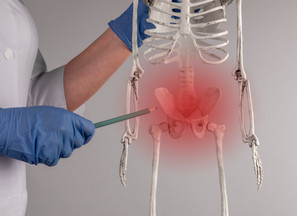Posted by Dee Cee Labs on Jun 9th 2025
Explaining the Gut-Spine Connection to Patients
Chiropractors know that the body operates as a unified system, where the health of one area influences the functionality of others. One of the most fascinating connections in the human body is the relationship between the gut and the spine. This link, often referred to as the gut-spine connection, plays a critical role in overall health and wellness. Patients experiencing chronic back pain, digestive issues, or systemic inflammation may benefit from understanding this connection and how chiropractic care can help optimize it.
What Is the Gut-Spine Connection?
The gut and spine are interconnected through the nervous system, particularly the vagus nerve, which links the brain, spine, and digestive system. This relationship is a two-way street:
- How the Spine Affects the Gut: Misalignments in the spine, particularly in the thoracic and lumbar regions, can interfere with nerve signals to the digestive system. This disruption can lead to symptoms like bloating, constipation, and poor nutrient absorption.
- How the Gut Affects the Spine: An unhealthy gut can contribute to systemic inflammation, which may manifest as back pain, joint stiffness, or even spinal misalignment.
When these systems are out of balance, the result can be a cycle of discomfort and dysfunction that affects a patient’s overall well-being.
The Impact of Spinal Misalignments on Gut Health
The nervous system controls digestive functions, including motility, secretion, and nutrient absorption. Misalignments in the spine (subluxations) can disrupt these processes by:
- Compressing Nerves: Spinal misalignments put pressure on the nerves that regulate digestive organs, leading to slowed digestion or irregular bowel movements.
- Reducing Circulation: Poor alignment can impair blood flow to the gut, compromising its ability to heal and function effectively.
- Triggering Inflammation: Chronic spinal misalignments contribute to inflammation, exacerbating gut issues like irritable bowel syndrome (IBS).
The Role of Gut Health in Spinal Wellness
Gut health is equally important for maintaining spinal alignment and reducing back pain. A compromised gut can:
- Increase Inflammation: An imbalance in gut bacteria (dysbiosis) can trigger systemic inflammation, affecting joints, muscles, and connective tissue in the spine.
- Weaken Immune Function: The gut houses a significant portion of the immune system. When gut health declines, the body’s ability to repair spinal and musculoskeletal tissues is impaired.
- Contribute to Pain Sensitivity: Poor gut health may amplify the body’s pain response, making conditions like sciatica or arthritis more debilitating.
How Chiropractors Can Explain the Gut-Spine Connection
When discussing the gut-spine connection with patients, chiropractors can use simple, relatable language to help them understand the relationship and provide a comprehensive guide to improving gut health.
Key Points to Communicate:
- The Body as a System: Explain that the spine and gut are not separate entities but part of an interconnected system that relies on proper communication through the nervous system.
- The Role of Nerves: Highlight how spinal misalignments disrupt nerve signals to the digestive organs, contributing to symptoms like bloating, constipation, or indigestion.
- The Inflammation Cycle: Discuss how an unhealthy gut can lead to inflammation that worsens back pain and spinal issues.
- The Chiropractic Advantage: Emphasize that chiropractic care supports both spinal alignment and nervous system function, which can help restore gut health and overall balance.
Chiropractic and Nutritional Support for Gut-Spine Health
Combining chiropractic adjustments with dietary strategies can enhance both spinal and gut health. Encourage patients to:
1. Stay Hydrated
- Proper hydration supports spinal discs and gut motility, reducing inflammation and discomfort.
2. Eat a Fiber-Rich Diet
- A diet high in fiber promotes gut health and reduces systemic inflammation, benefiting spinal health.
3. Incorporate Probiotics
- Probiotics improve gut bacteria balance, which can positively affect both digestion and pain sensitivity.
4. Avoid Inflammatory Foods
- Encourage patients to limit processed foods, sugar, and trans fats, which can worsen inflammation and contribute to spinal pain.
Explaining the Benefits of Chiropractic Care
Help patients understand how regular chiropractic adjustments can optimize the gut-spine connection by:
- Restoring Alignment: Adjustments reduce nerve interference, improving communication between the brain and gut.
- Reducing Inflammation: Chiropractic care helps lower inflammation in the spine and throughout the body.
- Enhancing Recovery: Proper spinal alignment supports the nervous system, promoting faster healing and better digestive function.
The gut and spine share a powerful connection that impacts nearly every aspect of health. By addressing spinal misalignments and guiding patients on nutrition, chiropractors can optimize the gut-spine relationship, helping patients experience better digestion, reduced pain, and improved overall wellness.
Educating patients on this connection empowers them to take a proactive role in their health, combining chiropractic care with healthy dietary habits to achieve long-lasting benefits.

